 | | | “The more clearly we can focus our attention on the wonders and realities of the universe about us, the less taste we shall have for destruction.”
—Rachel Carson | | | | | | April arrives like a slow exhale. Trees unfurl their green promise, and flowers bloom in gardens across campuses. Spring’s rhythm invites both reflection and resolve. As we celebrate Earth Week, the climate crisis feels increasingly immediate, and the calls for bold action grow louder. In this season of growth, we recommit ourselves to justice, science, and collective care. At the Rachel Carson Council, we believe every campus is a seedbed for change. From ambitious sustainability efforts to powerful narratives of resilience emerging from our fellows and faculty, higher education remains one of our most vital tools for cultivating a livable, just future. But even as campuses bloom with climate innovation, they are weathering an unprecedented storm. Across the country, academic institutions—from Harvard to Princeton, NYU to the University of Michigan—are under siege. The Trump administration’s sweeping campaign of grant freezes, DEI rollbacks, and political investigations poses a grave threat to academic freedom and the future of environmental and social progress. Billions in research funding hang in the balance. Faculty face censorship. Students are silenced. These attacks seek to undermine the very spaces where climate justice, truth-telling, and inclusive education take root. In this critical moment, we stand with the scholars and institutions defending their autonomy, and we recognize that the fight for the planet is inseparable from the fight for the freedom to imagine, teach, and act. 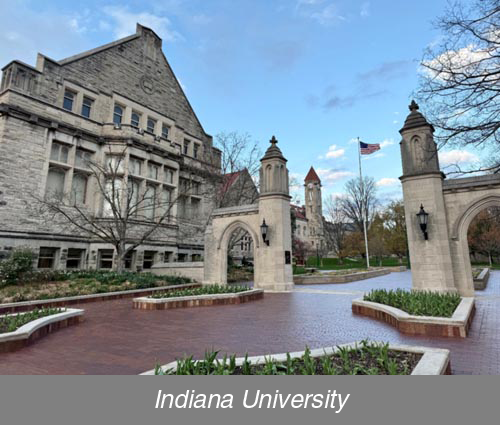 This April, we’re proud to welcome two new members to the RCC Campus Network—both leading climate efforts in distinct corners of the country. Director of Campus and Civic Engagement, Diego Tovar, visited Indiana University (IU), nestled in the lush hills of Bloomington. IU’s impressive Campus Sustainability Innovation Fund awards up to $50,000 annually to student, faculty, and staff-led projects. Paired with a Climate Action Plan rooted in community collaboration, IU is transforming the Midwest into a hub of climate advocacy and resilience. Tovar also visited the heart of Music City in Nashville to create an official partnership with Vanderbilt University. Vanderbilt harmonizes tradition with innovation. Powered entirely by renewable energy through the TVA Green Invest Program, Vanderbilt is proving that climate leadership in the South can be bold, creative, and community-driven. Together, these campuses embody the spirit of Earth Month, fueled by action and committed to a better world. This April, we’re proud to welcome two new members to the RCC Campus Network—both leading climate efforts in distinct corners of the country. Director of Campus and Civic Engagement, Diego Tovar, visited Indiana University (IU), nestled in the lush hills of Bloomington. IU’s impressive Campus Sustainability Innovation Fund awards up to $50,000 annually to student, faculty, and staff-led projects. Paired with a Climate Action Plan rooted in community collaboration, IU is transforming the Midwest into a hub of climate advocacy and resilience. Tovar also visited the heart of Music City in Nashville to create an official partnership with Vanderbilt University. Vanderbilt harmonizes tradition with innovation. Powered entirely by renewable energy through the TVA Green Invest Program, Vanderbilt is proving that climate leadership in the South can be bold, creative, and community-driven. Together, these campuses embody the spirit of Earth Month, fueled by action and committed to a better world. 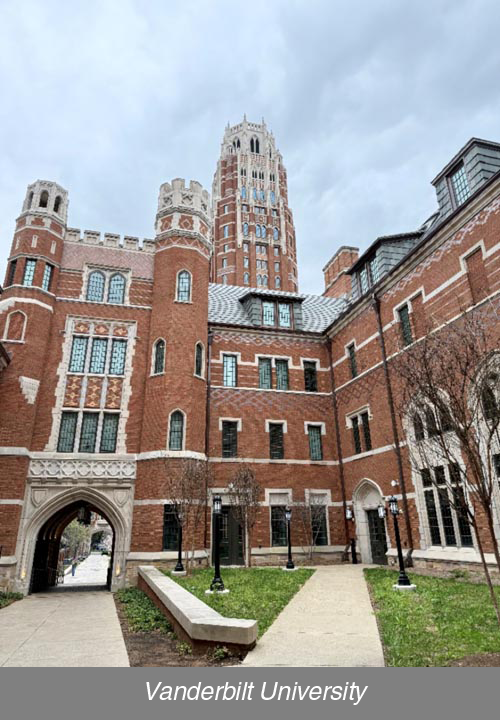 Across the network, RCC campuses are pushing boundaries and telling stories that matter. At the University of North Carolina Wilmington, faculty are collaborating on a documentary that traces the path of resilience in the wake of Hurricane Florence. Duke University celebrated Oceans Week with hands-on engagement, while NC State hosted the traveling Sun Boxes sound installation, helping students slow down and connect artfully to the Earth. Across the network, RCC campuses are pushing boundaries and telling stories that matter. At the University of North Carolina Wilmington, faculty are collaborating on a documentary that traces the path of resilience in the wake of Hurricane Florence. Duke University celebrated Oceans Week with hands-on engagement, while NC State hosted the traveling Sun Boxes sound installation, helping students slow down and connect artfully to the Earth.
Stony Brook University continues to bridge science and community through its leadership role in the New York Climate Exchange, while American University digs deep, literally, through waste audits that drive a 41% diversion rate. Catawba College is breaking ground, too, launching its most ambitious capital improvement plan to date, with sustainability at its core. Some milestones are even bigger: Oberlin College has reached its long-anticipated goal of carbon neutrality by 2025. This was a 20-year journey of commitment, innovation, and unwavering belief that institutions can lead and change. Still, alongside celebration, there is deep concern. A powerful opinion piece from Flint, Michigan reminds us of the consequences when environmental justice efforts are weakened. Written by an EPA Environmental Justice Advisory Council member, it underscores the human cost of political rollbacks, especially in communities still living with the legacy of polluted water and broken trust. 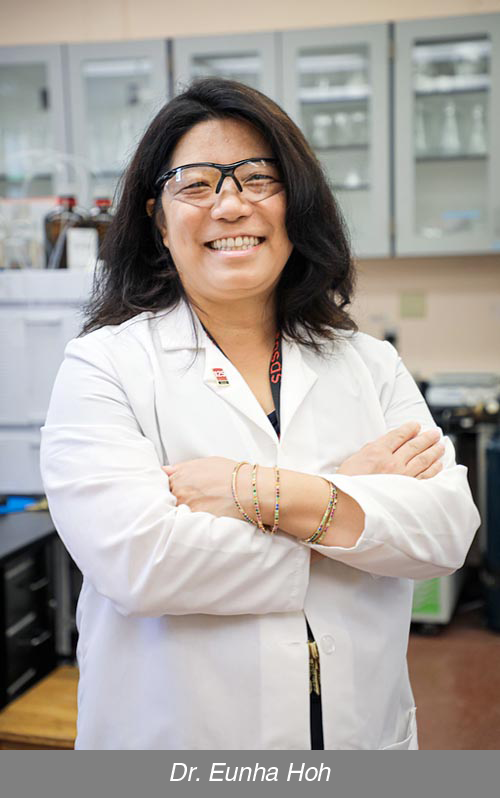 In this month’s RCC Fellows Speak Out, our contributors reflect this intersection of beauty and struggle. In Utah, Tundra swans glide over the Bear River Refuge, where an RCC Presidential Fellow’s journey as a birder first took flight. At Duke Campus Farm, in a pair of essays, regenerative agriculture and tradition and the importance of farmworkers combine, illustrating the healing power of land and labor. In this month’s RCC Fellows Speak Out, our contributors reflect this intersection of beauty and struggle. In Utah, Tundra swans glide over the Bear River Refuge, where an RCC Presidential Fellow’s journey as a birder first took flight. At Duke Campus Farm, in a pair of essays, regenerative agriculture and tradition and the importance of farmworkers combine, illustrating the healing power of land and labor.
In our Faculty Spotlight section, we uplift San Diego State University’s Eunha Hoh, whose research on DDT dumping off the coast of Catalina Island is featured in the new documentary Out of Plain Sight. It’s a chilling reminder that environmental neglect, if not exposed, can lie in wait for generations.
Our Campus Research section explores rising health risks for farmworkers due to climate-exacerbated heat, as reported by Duke PhD candidate Elizabeth Rojo. Meanwhile, Clark University researchers are leading behavioral studies on how Long Island Sound residents can better protect their watershed through septic upgrades and fertilizer reduction.
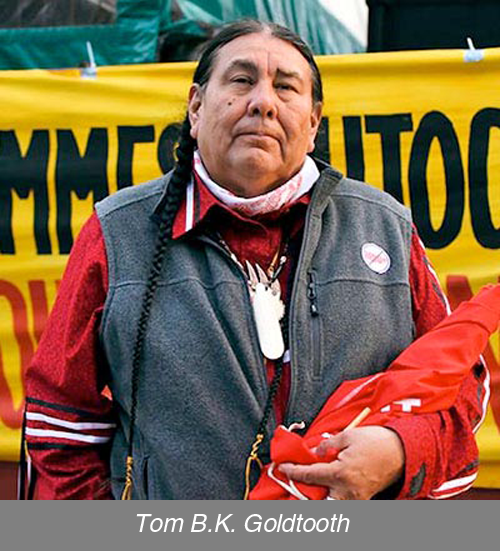 In Roots of Resistance, we honor Tom B.K. Goldtooth, whose leadership of the Indigenous Environmental Network embodies a sacred, enduring resistance. Goldtooth teaches us that climate justice is not just policy, it is spiritual, ancestral, and ongoing. In Roots of Resistance, we honor Tom B.K. Goldtooth, whose leadership of the Indigenous Environmental Network embodies a sacred, enduring resistance. Goldtooth teaches us that climate justice is not just policy, it is spiritual, ancestral, and ongoing.
And in our Books section, we spotlight Fresh Banana Leaves by Dr. Jessica Hernandez. This vital text merges Indigenous science, personal history, and powerful critique of colonial conservation. Her story, beginning beneath the shelter of a banana tree, blossoms into a broader call for a more inclusive, just ecological future.
As we arrive at the intersection of campus attacks and Earth Week, let us remember that every act of advocacy, scholarship, and solidarity plants something. And from those seeds, the future grows. Stay informed. Stay engaged.
And join us in amplifying these powerful stories from campuses nationwide. | | | | | | 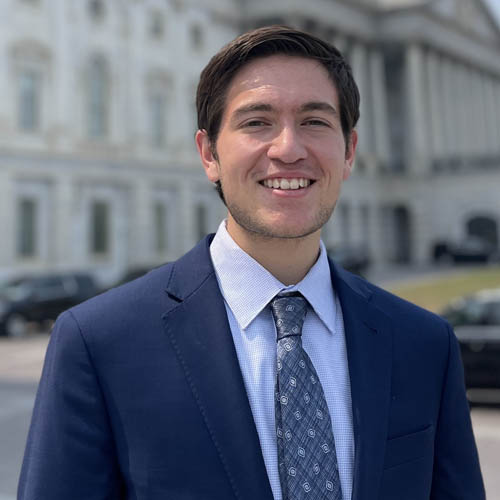 Diego Tovar — Assistant Director of Campus and Civic Engagement Diego Tovar — Assistant Director of Campus and Civic Engagement
Diego Tovar, Assistant Director of Campus and Civic Engagement, holds his master’s in Global Environmental Policy from American University and an undergraduate degree as a Udall Scholar in Ecosystem Science and Sustainability with a minor in Political Communication from Colorado State University. Diego has worked for the White House Council on Environmental Quality, the Environmental Protection Agency, the U.S. House of Representatives, and the Navajo Nation Washington Office focusing on climate justice and climate adaptation. | | | | | | Bloomington in Bloom: Climate Advocacy on the Rise Nestled amongst the rolling hills and lush greenery of Bloomington stands Indiana University (IU). Renowned for its sprawling woodlands and historic limestone architecture, IU has become a powerhouse of sustainability in the Midwest. Their Campus Sustainability Innovation Fund allocates up to $50,000 annually to support student, faculty, and staff projects aimed at advancing sustainability on campus. | | | | | | | | Vandy Leads the Way in Music City As spring begins to stretch its green fingers across Nashville, there’s a sense of renewal in the air—dogwoods blooming, music humming from every street corner, and a vibrant energy pulsing through Vanderbilt University’s campus. Nestled in the heart of Music City, Vanderbilt has become a beacon for sustainability and climate action in the South, demonstrating how institutions can drive real change. The university powers its entire campus with renewable energy through a collaborative agreement with the TVA Green Invest Program, which offsets their electricity consumption with solar power. | | | | | | | | Documentary Film Project to Focus on Down East Resilience Two University of North Carolina Wilmington professors are collaborating this semester on a documentary celebrating community resilience, adding a new perspective to the overall effort of the Down East Resilience Network. The network, often referred to as DERN, evolved in the years after Hurricane Florence ravaged coastal North Carolina in September 2018. It’s a project of the Core Sound Waterfowl Museum and Heritage Center on Harkers Island, which was hit particularly hard by the slow-moving Category 1 storm. | | | | | | | | Photo Essay: Blue Devils Dive into Oceans Week Oceans Week at Duke University, held March 24-28, celebrated Duke’s leadership in ocean sustainability and explored how institutions like Duke can source local, regional and sustainable seafood to reduce carbon footprints and support coastal communities. “Oceans Week was an exciting step in bringing together the many ocean-focused efforts happening across Duke—from ocean policy and marine research to sustainable seafood and coastal resilience.” said Stephanie J. Rousso. | | | | | | | | Sun Boxes: Music as a Tool for Community and Environmental Engagement In an era of infinite information and digital noise, combined with the mounting stress of coursework, Craig Colorusso’s Sun Boxes offer a rare respite for students: a space to slow down, listen and just be. Travelling around NC State’s campus from April 8-28, Meditation with Sun Boxes intertwines STEM, art and nature into an immersive music experience for students to unwind as they prepare for the end of the semester. Check out the Sun Boxes traveling exhibit schedule and locations here. | | | | | | | | Seeking Solutions: Stony Brook’s Role in Collaborative Climate Action Through its collaboration with The New York Climate Exchange, Stony Brook University serves as a vital hub connecting academic research with community action for developing and deploying dynamic solutions to our global climate crisis. This partnership plays a key role in transforming climate research into practical solutions and community engagement. | | | | | | | | Digging Through Trash is Not a Waste AU boasts a current waste diversion rate of 41 percent—up from 30 percent in 2023—thanks in part to regular audits conducted by the Zero Waste Office. Waste audits are not for the faint of stomach. The odor is foul. The work is unglamorous. But the purpose behind digging through dozens of trash bags of waste by hand is essential to American University’s sustainability work. | | | | | | | | | | Catawba College Breaking Ground on Historic Capital Improvements New construction and renovations will elevate the campus experience and serve as a model of sustainability for the region. Catawba College will celebrate a major milestone in its campus evolution with a groundbreaking ceremony on Tuesday, April 29, marking the beginning of the most ambitious capital improvements initiative in the institution’s history. The event will begin at 2:00 p.m. outside Ketner Hall and continue in the Tom Smith Auditorium for formal remarks. | | | | | | | | Carbon Neutral 2025 - We did it! Oberlin prepares its graduates to change the world for good. In 2025, we’re celebrating a milestone of change for our campus: We’ve achieved carbon neutrality! This ambitious goal took shape more than 20 years ago. It began with a 2004 pledge of environmental stewardship by our Board of Trustees, followed two years later by Oberlin’s participation as an initial signatory on a university climate commitment that grew to include a network of some 900 U.S. institutions—the step that cemented our pledge to be carbon neutral by 2025. | | | | | | | | Opinion: I Live in Flint, Michigan. Shuttering Environmental Justice at EPA Hurts Communities Like Mine. I serve on the EPA’s National Environmental Justice Advisory Council, and I believe its preservation is critical. Eleven years ago Flint, Michigan, fatefully switched its drinking water supply to the Flint River. The consequences are well-documented: significant damage to pipes, a historic outbreak of Legionnaires’ disease, system-wide lead contamination. My then-three-year-old son was one of the children who drank that lead-tainted water. | | | | | | | | Rachel Carson’s Legacy Endures at Bear River Tundra Swans begin to flock to northern Utah’s wetlands in early March, their snow-white bodies often blending with skies still frosted over from February. The Great Salt Lake’s wetlands are the perfect vacation homes on their journey to Canada and Alaska, full of food and space to rest. Tundra swans, in a way, are my spark bird. I hadn’t truly committed myself to the life of a birder until a seasoned birder took me to the Bear River Migratory Bird Refuge. | | | | | | | | Rooted in Tradition: Regenerative Agriculture and Lessons from the Duke Campus Farm From digging in the dirt on the occasional volunteer day to a class visit with my Global Maternal and Child Health class, I’ve dirtied my hands a few times at the Duke University Campus Farm. Each moment I spend there is enriching, harvesting tomatoes from the vine, and smelling the petrichor in the air after a fall rainstorm. There is something magical about seeing the literal fruits of your labor. When you harvest something you work to grow, you can almost taste the nutrients that the plant pulls from the soil. | | | | | | | | The Forgotten Work That Feeds Us I traced my hand along the edges of the mulch bed, feeling the rough moistness of the soil beneath my fingers as I crouched down, pulling weeds. The sun bore down relentlessly, and the heat pressed on me like a weight as I worked. Smothered in sunscreen, my peers and I moved through the rows of cilantro and carrot plants, each of us focused on clearing the stubborn weeds from the beds. Unlike the air-conditioned classrooms or comfortable dorms I could have been in, I was here, at Duke Campus Farm, braving the sweltering afternoon heat. | | | | | | | | Underwater Graveyard Exposes Toxic DDT Threat Near Catalina Island in the New Documentary ‘Out of Plain Sight’ SDSU professor Eunha Hoh is featured in the film’s premiere at the San Diego Asian Film Festival Not far from San Diego, under the pristine waters off the coast of Catalina Island, lurks a dirty secret. A toxic graveyard of half a million barrels, filled with decades-old manufacturing waste products, is rusting into the sea. | | | | | | | | Spotlight on Climate-Related Health Challenges During a presentation Elizabeth Rojo stopped at a slide listing two names and photos. The two people had recently died working on North Carolina farms in high heat conditions. With 2.3 million farm workers in the U.S., the state of North Carolina has the sixth largest farmworker community nationwide, said Rojo, a Ph.D. candidate at Duke. Climate change is putting many of these lives at greater risk. | | | | | | | | Will Long Island Sound Residents Make Changes to Help Protect It? With over $1.5M in funding, Clark researcher studies how to encourage less fertilizer use, more septic upgrades Millions of people live, work and recreate in communities that surround the 1,320-square miles that comprise Long Island Sound. Connecticut and New York have worked for decades to restore water quality and protect the wildlife, habitats, and ecosystem services provided by the Sound. | | | | | | | | Harvard Won’t Comply With Demands From Trump Administration Changes pushed by government ‘unmoored from the law,’ Garber says. ‘The University will not surrender its independence or relinquish its constitutional rights.’ Harvard on Monday rejected demands from the Trump administration that threaten $9 billion in research funding, arguing that the changes pushed by the government exceed its lawful authority and infringe on both the University’s independence and its constitutional rights. | | | | | | | | Trump Official Threatens Harvard Foreign Student Admissions as More Universities Rally in Support Kristi Noem demands university’s records on foreign students’ ‘illegal’ activities while president threatens to strip it of tax-exempt status Donald Trump has declared that Harvard University should no longer receive federal funds, calling it a “joke” that “teaches hate and stupidity”, while his administration said the pre-eminent US university could lose its ability to enroll foreign students. | | | | | | | | Northwestern Law Professors Win Battle as House Committee Withdraws Investigation Request In a significant victory for academic freedom and constitutional rights, Northwestern Law School professors Sheila Bedi and Lynn Cohn have successfully challenged a federal investigation targeting their legal clinic work. The U.S. House Education and Workforce Committee withdrew its investigative demands against Northwestern University and the Law School's Bluhm Legal Clinic program during an emergency federal court hearing in Chicago Wednesday. | | | | | | | | University of Michigan Scraps Multimillion Dollar DEI Investment The move shuttered the public flagship’s Office of Diversity, Equity and Inclusion and Office for Health Equity and Inclusion, effective immediately. In Thursday’s announcement, President Santa Ono and other university leaders cited President Donald Trump’s flurry of executive orders attacking DEI efforts and the U.S. Department of Education’s resulting Dear Colleague letter. | | | | | | | | Harvard University Faces $9B Federal Funding Review The investigation into the Ivy League institution is the largest yet by the Trump administration’s Joint Task Force to Combat Anti-Semitism. The Trump administration is reviewing billions of dollars in federal grants and contracts to Harvard University over what it claimed was a failure to protect Jewish students from antisemitism, according to a Monday announcement. | | | | | | | | Trump Administration Suspends Dozens of Princeton University’s Research Grants Federal agencies have suspended “several dozen” federal research grants to Princeton University, the Ivy League institution announced Tuesday. The move comes as the Trump administration attacks high-profile colleges over campus antisemitism allegations. Multiple agencies, including the U.S. Department of Energy, the U.S. Department of Defense and NASA, notified the university of the freezes on Monday and Tuesday, Princeton President Chris Eisgruber said in a community message. | | | | | | | | Scholar Warns of Chilling Speech in Higher Ed After NYU Canceled Her Presentation A prominent physician said university administrators nixed the event over concerns some material might be considered antisemitic and anti-government. A prominent public health scholar warned of self-censorship and the chilling of free speech in higher education after New York University administrators in March abruptly canceled her presentation over what she described as concerns that certain material could be perceived as antisemitic and anti-government. | | | | | | | | Princeton Grants Suspended as Federal Pressure on Universities Grows In a concerning development for research institutions nationwide, Princeton University has become the most recent Ivy League school to have federal funding suspended amid what many academic leaders are describing as an unprecedented federal pressure campaign targeting elite universities. Princeton President Dr. Christopher Eisgruber announced earlier this week that "several dozen" federal research grants from agencies including the Department of Energy, NASA, and the Department of Defense have been halted. | | | | | | | | Harvard University Faces Funding Ultimatum From Trump Administration The three federal agencies behind the letter — the U.S. Department of Education, U.S. Department of Health and Human Services, and U.S. General Services Administration — said the list of nine demands represent “broad, non-exhaustive areas of reform” that Harvard must enact “to remain a responsible recipient of federal taxpayer dollars.” Their letter called on Harvard to eliminate all diversity, equity and inclusion efforts and prove it does not offer preferential treatment based on race, color or national origin in admissions or hiring. | | | | | | | | Harvard Faculty, AAUP Challenge Trump Administration's $8.7 Billion Funding Threat In what legal experts are calling a landmark case for academic freedom, Harvard faculty and the American Association of University Professors (AAUP) have filed a lawsuit against the Trump administration, alleging unconstitutional attempts to control campus speech and governance through threatened funding cuts. The legal action, filed Friday, seeks to block the administration from withholding $8.7 billion in federal funding. | | | | | | | | Tom Goldtooth: The Spiritual Warrior of Climate Justice Tom B.K. Goldtooth has spent decades at the frontlines of environmental justice, transforming grief into power, and ceremony into resistance. A Diné and Dakota leader, he has redefined what it means to protect the Earth. Through his work as executive director of the Indigenous Environmental Network (IEN), Goldtooth has uplifted Indigenous voices on the global stage and brought sacred teachings into spaces often dominated by policy and profit. | | | | | | | | Fresh Banana Leaves: Healing Indigenous Landscapes Through Indigenous Science (North Atlantic Books, January 18th, 2022)  In Fresh Banana Leaves environmental scientist Jessica Hernandez, Ph.D. weaves personal history with urgent calls for environmental justice, offering a perspective often missing from mainstream conservation dialogues. Drawing on the life of her father, a Maya Ch’orti’ survivor of El Salvador’s civil war, Hernandez roots her exploration in lived experience, beginning with a memory of her father hiding beneath the broad fronds of a banana tree, an immigrant species that nonetheless offered shelter and survival. In Fresh Banana Leaves environmental scientist Jessica Hernandez, Ph.D. weaves personal history with urgent calls for environmental justice, offering a perspective often missing from mainstream conservation dialogues. Drawing on the life of her father, a Maya Ch’orti’ survivor of El Salvador’s civil war, Hernandez roots her exploration in lived experience, beginning with a memory of her father hiding beneath the broad fronds of a banana tree, an immigrant species that nonetheless offered shelter and survival.
This story becomes a powerful metaphor throughout the book. Like the banana tree, Hernandez’s father was displaced, resilient, and forced to adapt to unfamiliar lands. Hernandez uses such vivid, intergenerational storytelling to challenge dominant Western approaches to ecology, ones that frequently erase the presence and knowledge of Indigenous communities. The book blends first-person narratives, case studies, and cultural insight to reveal how colonialism, land theft, and scientific exclusion have shaped environmental harm. Thoughtful, grounded, and rich with cultural insight, Hernandez offers critiques, but also a vision for a more inclusive, equitable path forward where healing the land also means healing historical injustices. Purchase: Fresh Banana Leaves __________
Diego Tovar — Assistant Director of Campus and Civic Engagement Diego Tovar, Assistant Director of Campus and Civic Engagement, holds his master’s in Global Environmental Policy from American University and an undergraduate degree as a Udall Scholar in Ecosystem Science and Sustainability with a minor in Political Communication from Colorado State University. | | | | | | RCC prides itself on its National Campus Network of more than 75 colleges and universities. We are working to engage faculty members, students, and administrators in our efforts for a more just and sustainable world. With our growing fellowship program, our presence on campuses across the country has never been greater. Contact RCC today to bring our staff to your campus for lectures, workshops, or meetings to help find the best ways to engage your faculty and students in the efforts against climate change, environmental justice, and the work of the Rachel Carson Council. Campus Visits with RCC President, Dr. Robert K. Musil 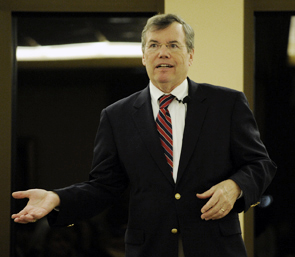 RCC President & CEO, Dr. Robert K. Musil, a national leader in climate change, environmental justice and health is available to book for in-person campus speaking events! Musil has been called “informative, challenging and inspirational all at once.” He is “motivational” with “intellectual depth” and “extraordinary impact.” RCC President & CEO, Dr. Robert K. Musil, a national leader in climate change, environmental justice and health is available to book for in-person campus speaking events! Musil has been called “informative, challenging and inspirational all at once.” He is “motivational” with “intellectual depth” and “extraordinary impact.”
Dr. Musil offers compelling campus lectures and visits involving classes, meetings with campus and community groups, consultations with faculty and administrators, or for Earth Day, Commencement, and other special events. Stays range from one to three days. Reduced fees are in place for 2025-2026 and can be designed to meet reduced budgets. To arrange a campus visit with Dr. Musil, contact the RCC President’s Office at bmusil2@yahoo.com The RCC also offers talks, classes, and workshops on student engagement, activism, sustainability, and the RCC Fellowship program with: Director of Communications, Claudia Steiner; Assistant Director of Campus and Civic Engagement, Diego Tovar; Associate Director of Policy and Programs, Theo Daniels and Assistant Director of Policy and Programs, Joy Reeves. To arrange, contact Assistant Director of Campus and Civic Engagement, Diego Tovar. | | | | | | | |  The Rachel Carson Council Depends on Tax-deductible Gifts From Concerned Individuals Like You. Please Help If You can. The Rachel Carson Council Depends on Tax-deductible Gifts From Concerned Individuals Like You. Please Help If You can. | | | |  Sign Up Here to Receive the RCC E-News and Other RCC Newsletters, Information and Alerts. Sign Up Here to Receive the RCC E-News and Other RCC Newsletters, Information and Alerts. | | | | | | | | | | | |